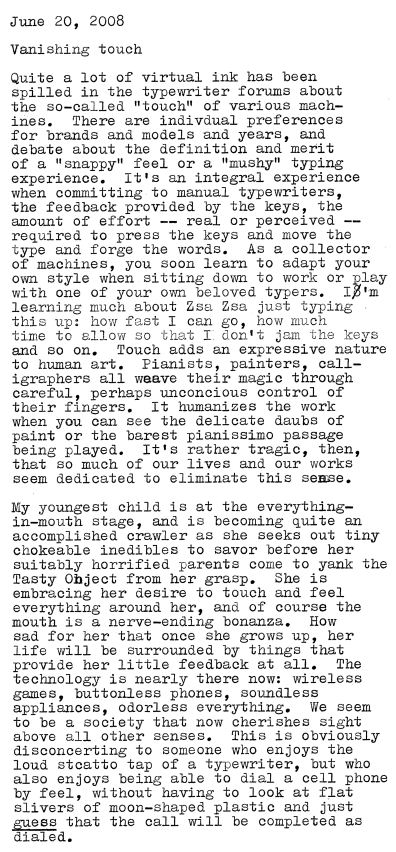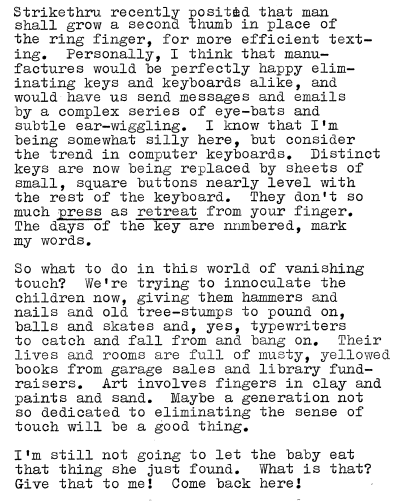

I will blame most of the mistakes in this typecast on the fact that this is really the first time I've used Zsa Zsa for anything longer than a typing test, and so was distracted by a drying/fading ribbon and not knowing her touch. Yes, the irony is not lost on me. What is very much my fault is that Strikethru said that pinkies will go away, not ring fingers. This is a much more sensible, and a mistake I did not see until I was several lines down the page.
Curse the first-draft nature of typecasts!

7 comments:
I still believe the kinethetic/tactile folk shall inherit the earth. No amount of futuristic ear-wiggling text messages will ever change us.
I don't text anyway. It's too ridiculous. It's a phone, for God's sake, so just CALL them.
Remind me to rant sometime about the absurdity of a walkie-talkie function on cell phones. Now everybody can be annoyed by both sides of the conversation!
I think that whatever happens with the future of communications technology, people will in some way continue to insist on the once-removed control/anonymity that text only messages provide. I think directly talking to people with voice or seeing them on video is entirely too intimate for a lot of people, and lacks the ability to be on the user's terms (e.g., if they don't feel like responding, they don't have to, and/or, no one has to know where they are, what they look like, or what they're doing, also, the conversation does not have to fit into a window of time).
Anyway, I think people's desire for anonymity and control is a large part of the reason texting is so popular (since as you point out Monda, calling someone is just easier).
On the bright side, in a way texting has brought back writing for a lot of people, no matter how truncated and nonsensical, so in that way I kind of appreciate it.
Oops, me again, I just wanted to say, I agree with you about the tactile nature of the input being possibly history. I was just looking at the latest Microsoft keyboards last week, and they are all paper thin, with these flat, click-less keys-- I typed on one to test it out and it felt like those buttons on a microwave, where you're not really sure you've pressed anything unless the display tells you so.
I still insist on using my super loud, old-school IBM model M clicky keyboard at work, with the buckling spring typewriterlike keys, much to the scorn of my colleagues.
Ok, enough out of me today!!
Those IBM keyboards are highly-praised and much-missed in the programmer community, which is ironic considering the tendency towards faster-newer-better. We used actual Model M's in the computer labs in college, hooked up to the terminals for the mainframe with the waching machine-sized harddrive. Imagine a room full of LOUD typing, with occasional belches of paper from the giant line printer in the middle of the room. It was a temple dedicated to noise and bad code.
Responding here not so much to the typecast itself which, coincidentally, I thought was spot-on, Mike; but responding here to Cheryl and her texting-as-a-means-of-creating-distance idea. I agree way over 100 percent, and am going to take this time, in Mike's space, to once again suggest - no, insist - that you read Infinite Jest, which has this big long section dedicated to just this idea. It's written (the big, long section) from a point in the very near future, after video-phones have come and gone, and by way of explanation of the technology's demise, it gives an argument not unlike what you've given here.
That's twice I've seen Infinite Jest recommended in under a week. I', going to have to check it out.
Post a Comment